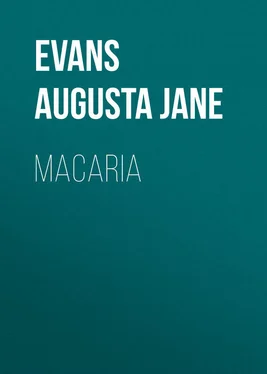Augusta Evans - Macaria
Здесь есть возможность читать онлайн «Augusta Evans - Macaria» — ознакомительный отрывок электронной книги совершенно бесплатно, а после прочтения отрывка купить полную версию. В некоторых случаях можно слушать аудио, скачать через торрент в формате fb2 и присутствует краткое содержание. Жанр: foreign_antique, foreign_prose, Историческая проза, на английском языке. Описание произведения, (предисловие) а так же отзывы посетителей доступны на портале библиотеки ЛибКат.
- Название:Macaria
- Автор:
- Жанр:
- Год:неизвестен
- ISBN:нет данных
- Рейтинг книги:3 / 5. Голосов: 1
-
Избранное:Добавить в избранное
- Отзывы:
-
Ваша оценка:
- 60
- 1
- 2
- 3
- 4
- 5
Macaria: краткое содержание, описание и аннотация
Предлагаем к чтению аннотацию, описание, краткое содержание или предисловие (зависит от того, что написал сам автор книги «Macaria»). Если вы не нашли необходимую информацию о книге — напишите в комментариях, мы постараемся отыскать её.
Macaria — читать онлайн ознакомительный отрывок
Ниже представлен текст книги, разбитый по страницам. Система сохранения места последней прочитанной страницы, позволяет с удобством читать онлайн бесплатно книгу «Macaria», без необходимости каждый раз заново искать на чём Вы остановились. Поставьте закладку, и сможете в любой момент перейти на страницу, на которой закончили чтение.
Интервал:
Закладка:
CHAPTER VIII
A DISCOVERY
"I am so glad to see you, Mr. Young. Louisa is not sick, I hope?"
"I came for you in Louisa's place; she is not well enough to quit her room. Did you suppose that I intended leaving you here for another month?"
"I was rather afraid you had forgotten me; the prospect was gloomy ten minutes ago. It seems a long time since I was with you."
She stood close to him, looking gladly into his face, unconscious of the effect of her words.
"You sent me no note all this time; why not?"
"I was afraid of troubling you; and, besides, I would rather tell you what I want you to know."
"Miss Irene, the carriage is at the door. I am a patient man, and can wait half an hour if you have any preparation to make."
In much less time she joined him, equipped for the ride, and took her place beside him in the carriage. As they reached his father's door, and he assisted her out, she saw him look at her very searchingly.
"It is time that you had a little fresh air. You are not quite yourself. Louisa is in her room; run up to her."
She found her friend suffering with sore throat, and was startled at the appearance of her flushed cheeks. Mrs. Young sat beside her, and after most cordial greetings the latter resigned her seat and left them, enjoining upon her daughter the necessity of remaining quiet.
"Mother was almost afraid for you to come, but I teased and coaxed for permission; told her that even if I had the scarlet fever you had already had it, and would run no risk. Harvey says it is not scarlet fever at all, and he persuaded mother to let him go after you. He always has things his own way, though he brings it about so quietly that nobody would even suspect him of being self-willed. Harvey is a good friend of yours, Irene."
"I am glad to hear it; he is certainly very kind to me. But recollect you are not to talk much; let me talk to you."
The following morning found Louisa much better, and Irene and the mother spent the day in her room. Late in the afternoon the minister came in and talked to his sister for some moments, then turned to his mother.
"Mother, I am going to take this visitor of yours down to the library; Louisa has monopolized her long enough. Come, Miss Irene, you shall join them again at tea."
He led the way, and she followed very willingly. Placing her in a chair before the fire, he drew another to the rug; and seating himself, said just as if speaking to Louisa —
"What have you been doing these two months? What is it that clouds your face, my little sister?"
"Ah, sir! I am so weary of that school. You don't know what a relief it is to come here."
"It is rather natural that you should feel home-sick. It is a fierce ordeal for a child like you to be thrust so far from home."
"I am not home-sick now, I believe. I have in some degree become accustomed to the separation from my father; but I am growing so different from what I used to be; so different from what I expected. It grieves me to know that I am changing for the worse; but, somehow, I can't help it. I make good resolutions in the morning before I leave my room, and by noon I manage to break all of them. The girls try me and I lose my patience. When I am at home nothing of this kind ever troubles me."
"Miss Irene, yours is not a clinging, dependent disposition; if I have rightly understood your character, you have never been accustomed to lean upon others. After relying on yourself so long, why yield to mistrust now? With years should grow the power, the determination, to do the work you find laid out for you."
"It is precisely because I know how very poorly I have managed myself thus far that I have no confidence in my own powers for future emergencies. Either I have lived alone too long, or else not long enough; I rather think the last. If they had only suffered me to act as I wished, I should have been so much better at home. Oh, sir, I am not the girl I was eight months ago. I knew how it would be when they sent me here."
"Some portentous cloud seems lowering over your future. What is it? You ought to be a gleeful girl, full of happy hopes."
She sank farther back in her chair to escape his searching gaze and drooped her face lower.
"Yes, yes; I know I ought, but people can't always shut their eyes."
"Shut their eyes to what?"
"Various coming troubles, Mr. Young."
His lip curled slightly, and, replacing the book on the table, he said, as if speaking rather to himself than to her —
"The heart knoweth his own bitterness, and a stranger doth not intermeddle with his joy."
"You are not a stranger, sir."
"I see you are disposed to consider me such. I thought I was your brother. But no matter; after a time all will be well."
She looked puzzled; and, as the tea-bell summoned them, he merely added —
"I do not wonder. You are a shy child; but you will soon learn to understand me; you will come to me with all your sorrows."
During the remainder of this visit she saw him no more. Louisa recovered rapidly, and when she asked for her brother on Sabbath evening, Mrs. Young said he was to preach twice that day. Monday morning arrived, and Irene returned to school with a heavy heart fearing that she had wounded him; but a few days after, Louisa brought her a book and brief note of kind words. One Saturday morning she sat quite alone in her small room; the week had been specially painful, and, wearied in soul, the girl laid her head down on her folded arms, and thought of her home in the far South. A loud rap startled her from this painful reverie, and ere she could utter the stereotyped "come in," Louisa sprang to her side.
"I have come for you, Irene; have obtained permission from Dr. – for you to accompany us to the Academy of Design. Put on your bonnet; Harvey is waiting in the reception room. We shall have a charming day."
"Ah, Louisa! you are all very kind to recollect me so constantly. It will give me great pleasure to go."
When they joined the minister, Irene fancied he received her coldly, and as they walked on he took no part in the conversation. The annual exhibition had just opened; the rooms were thronged with visitors, and the hushed tones swelled to a monotonous hum. Some stood in groups, expatiating eagerly on certain pictures; others occupied the seats and leisurely scanned now the paintings, now the crowd. Furnished with a catalogue, the girls moved slowly on, while Mr. Young pointed out the prominent beauties or defects of the works exhibited. They made the circuit of the room, and began a second tour, when their attention was attracted by a girl who stood in one corner, with her hands clasped behind her. She was gazing very intently on an Ecce-Homo, and, though her face was turned toward the wall, the posture bespoke most unusual interest. Irene looked at her an instant, and held her breath; she had seen only one other head which resembled that – she knew the purplish waving hair, and gliding up to her she exclaimed —
"Electra! Electra Grey!"
The orphan turned, and they were locked in a tight embrace.
"Oh, Irie! I am so glad to see you. I have been here so long, and looked for you so often, that I had almost despaired. Whenever I walk down Broadway, whenever I go out anywhere, I look at every face, peep into every bonnet, hoping to find you. Oh! I am so glad. Do come and see me soon – soon. I must go now – I promised."
"Where do you live? I will go home with you now."
"I am not going home immediately. Mr. Clifton's house is No. 85, West – Street. Come this afternoon."
With a long, warm pressure of hands they parted, and Irene stood looking after the graceful figure till it glided out of sight.
"In the name of wonder, who is that? You two have been the 'observed of all observers,'" ejaculated the impulsive Louisa.
Читать дальшеИнтервал:
Закладка:
Похожие книги на «Macaria»
Представляем Вашему вниманию похожие книги на «Macaria» списком для выбора. Мы отобрали схожую по названию и смыслу литературу в надежде предоставить читателям больше вариантов отыскать новые, интересные, ещё непрочитанные произведения.
Обсуждение, отзывы о книге «Macaria» и просто собственные мнения читателей. Оставьте ваши комментарии, напишите, что Вы думаете о произведении, его смысле или главных героях. Укажите что конкретно понравилось, а что нет, и почему Вы так считаете.












